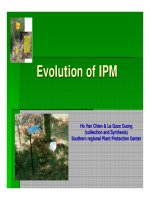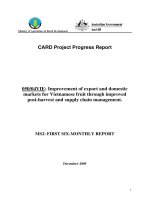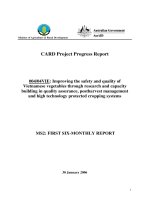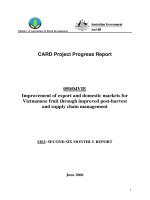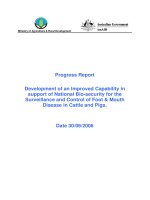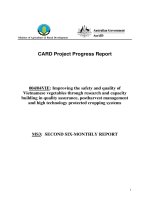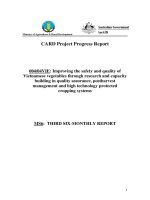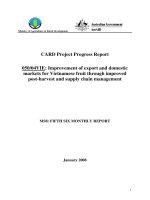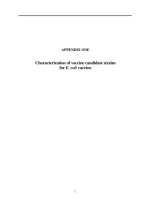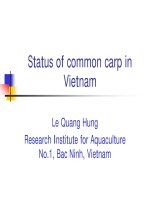Báo cáo nghiên cứu khoa học " Improvement of export and domestic markets for Vietnamese fruit through improved post-harvest and supply chain management - Milestone Report 7" doc
Bạn đang xem bản rút gọn của tài liệu. Xem và tải ngay bản đầy đủ của tài liệu tại đây (91.76 KB, 25 trang )
1
Ministry of Agriculture & Rural Development
Milestone Report 7
Improvement of export and domestic
markets for Vietnamese fruit through
improved post-harvest and supply chain
management
CARD Project 050/04VIE
Milestone Report 7
Date December 2008
1
Table of Contents
1 Institute Information 2
2 Contact Officer(s) 3
3 Project Abstract 4
4 Executive Summary 4
4.1 Introduction & Background 5
4.2 Implementation Highlights 6
4.3 Strategies for improved supply chains of selected fruits 6
4.3.1 Post-harvest training manual and mango post-harvest physiology manual 6
4.3.2 Quality assurance manuals 8
4.3.3 A complete set of promotional material including training aids for farmer training programs 9
4.4 Small holder Benefits and Capacity Building 14
4.5 Publicity 15
4.6 Project Management 18
5 Report on Cross-Cutting Issues 19
5.1 Environment 19
5.2 Gender and Social Issues 21
6 Implementation & Sustainability Issues 21
6.1 Issues and Constraints 21
6.2 Options 22
6.3 Sustainability 23
7 Next Critical Steps 23
8 Conclusion 24
2
1 Institute Information
Project Name Improvement of export and domestic
markets for Vietnamese fruit through
improved post-harvest and supply chain
management.
Vietnamese Institution Southern Sub-Institute of Agricultural
Engineering and Post-Harvest Technology
(SIAEP)
Vietnamese Project Team Leader Mr Nguyen Duy Duc, M. Eng.
Australian Organisation Queensland Department of Primary
Industries and Fisheries (DPI & F)
Australian Personnel Mr. Robert Nissen
Dr. Peter Hofman
Mr Brett Tucker
Mr. Roland Holmes
Date commenced September 2006
Completion date (original) May 2008
Completion date (revised) December 2008
Reporting period Milestone Report 7
3
2 Contact Officer(s)
In Australia: Team Leader
Name: Mr. Robert Nissen Telephone: +61 07 54449631
Position: Project Leader Fax: +61 07 54412235
Organisation Queensland Department of
Primary Industries and Fisheries
(DPI & F)
Email:
In Australia: Administrative contact
Name: Michelle Robbins Telephone: +61 07 3346 2711
Position: Senior Planning Officer
(Emerging Technologies)
Fax: +61 07 3346 2727
Organisation Queensland Department of
Primary Industries and
Fisheries (DPI & F)
Email:
In Vietnam
Name: Mr Nguyen Duy Duc, Telephone: +84 (8) 8481151
Position: Director SIAEP Fax: +84 (8) 8438842
Organisation Southern Sub-Institute of Agricultural
Engineering and Post-Harvest
Technology (SIAEP)
Email:
4
3 Project Abstract
4 Executive Summary
Design, development and production of a mango post harvest training manual and postharvest
physiology manual completed in July 2007 by the Australia CARD project team. Postharvest
training workshops were also designed and conducted during July-August 2007. These workshops
align with the proposed project activities 3, 5 6 7, 8, 9, 11, 12 and 13 and with project milestones 4,
7 and 9 and further build upon the CARD Project strategic plans developed in April 2006 for mango
and pomelo cooperatives in Southern Vietnam.
Development of quality manuals took some time especially using a consultative action learning
approach as agreement on quality levels acceptable to farmers, collators, wholesalers, traders,
SOFRI and SIAEP institute staff members involved in the project. One manual was developed for
Cat Hoa Loc Mango variety and two manuals for pomelo, one manual for Da Xanh and one for
Nam Roi.
As part of the promotional material and training aids for this CARD project, over 40 manuals were
developed and provide to the mango and pomelo farmers and to SIAEP and SOFRI staff. These
were provided in hard copy format and electronic format. These manuals cover areas such as:
• Introduction Value/Supply Chains
• Principles of supply chains
• Developing supply chains
• Supply chain analysis
• Developing Strategic Plans
• Developing Action Plans
• Developing new improved Supply Chains
• Mango Physiology and Postharvest Technology to improve supply chains
• Optimising Harvest Quality of Mango
The fruit industry in Vietnam has a great potential and plays an important role in agricultural
production. In 2003, Vietnam exported US$43 million of high value fruit to high-income countries
and imported US$14 million of fruit and vegetables. Vietnam is experiencing difficulties in
competing with other Asian nations in export markets and its own domestic market, especially with
China and Thailand. This suggests that Vietnam’s horticultural industries require substantial
development to be globally competitive. Vietnamese consumers are demanding safer and higher
quality fruit. This project has identified key pre-and post-harvest technology gaps that reduce
product quality, safety and consistency. Targeted training programs are focusing on the total
supply chain and are providing benefits by helping to implement quality management systems and
GAP systems at the village level providing greater employment for the farming community. This
project embraces the five CARD strategies for rural development; and in particular; strategies to
increase production and competitiveness of agricultural systems; reduce poverty and vulnerability,
and increase stakeholder participation whilst ensuring sustainability.
5
• Improving Mango harvest Systems
• Mango Ripening Room Design
• Supply Chain Management of Fresh Product Quality and Food Safety
• Marketing and Focus Groups
• Designing training Workshops for Farmers
• Socio-economic Analysis of Supply Chains
• Mango and Pomelo Orchard Design
• Integrated Pest and Disease Management for Mango and Pomelo
• Citrus Problem Solver
• Citrus Pruning and Training
• Using Chemicals
A consultative and participatory action learning approach was used to empower the rural poor and
supply chain participants in the decision making processes. The agreed directions in the strategic
and action plans for both mango and pomelo CARD project participants (SIEAP, SOFRI staff and
the mango and pomelo farmers) helped develop their skills via these workshops that aligned to the
CARD Project objectives.
The Objective, Reflective, Interpretative, and Decisional (ORID) system was used to evaluate the
effectiveness of farmer training schools and workshops conducted during this CARD Project.
Analysis of all workshops conduced showed the averages for all workshops conducted were:
• 70% of workshop participants thought workshops were of the right time length
• 70% of all participants understood concepts very well
• 100% of participants indicated that information presented was new to them
• 80% of participants indicated that information provided would be very useful to them to
develop new supply chains
4.1 Introduction & Background
Ford et al., (2003) analysed the competitiveness of fruit industries in Vietnam and identified:
• poor unstable product quality
• no quality standards
• poor post harvest technologies
• poor pre-harvest practices
• lack of group co-operative marketing structures
• little information about supply chains, prices and customers needs.
Stakeholder/beneficiary analysis of fruit crops in the Mekong delta showed that both mango and
pomelo (with plantings of 33 000 ha and 9 000 ha, respectively) are very important fruit crops in
Southern Vietnam. The objectives of this CARD project 05/04 VIE are to:
• Improved pre-harvest technologies to produce high quality mango (integrated pest
management, integrated crop management, fruit fly control, maturity indices, reduced
pesticide residues, better environmental and human health etc)
6
• Improve mango and pomelo post-harvest technologies (eg, cool chain management,
packaging, post-harvest dipping, ethylene ripening, waxing, washing and wetting agents,
quality assurance)
• Improve quality standards and quality assurance programs for mango and pomelo. The
approach and methodologies developed for these crops through this project will be
applied to other fruits and vegetables.
• Map current supply chains to domestic and selected export markets, with particular
emphasis on determining consumer preferences and needs, and reporting results back
to farmers.
• Provide a better understanding and possible improvements of the supply chain by
Vietnamese fruit industries for mango and pomelo.
This CARD project fills capacity gaps and reduces major weaknesses in pre-and post-harvest
technologies affecting product quality consistency and supply chain management and planning.
Highly specialised targeted training programs and research appropriate for institutions and industry
stakeholders was provided to complete CARD Project 050/04 VIE Milestone 7.
CARD Project Milestone 7:- strategies for improved supply chains of selected fruit comprises a
complete set of promotional material:- including training aids for framer training programs; and
promotional awareness material, such as:
• Post-harvest training manual
• Mango Post-harvest Physiology manual
• Quality assurance manual for mango and pomelo
4.2 Implementation Highlights
4.3 Strategies for improved supply chains of selected fruits
4.3.1 Post-harvest training manual and mango post-harvest physiology
manual
Development and design of a mango post-harvest training manual and post-harvest physiology
manual for Vietnam was undertaken by the Australian team in April to July 2007 (See Appendix A
for post-harvest training and physiology manual and session notes). Post harvest training
workshops were designed and conducted during July-August 2007. These workshops align with
the proposed project activities 3, 5 6 7, 8, 9, 11, 12 and 13 and with project milestones 4, 7 and 9
and further build upon the CARD Project strategic plans developed in April 2006 for mango and
pomelo cooperatives in Southern Vietnam.
SIAEP and SOFRI Staff members in train the trainer workshops were conducted then key growers
participated in four farmer school workshops during July 2007. These 2 day workshops involved
“participatory action learning” and “farmer training farmer” processes to develop solutions to
improving pre-, post-harvest and supply chain management impacts on mango and pomelo fruit
quality. Employing such a process allows this CARD project to obtain wider support from a cross
section of participants. This consultative and participatory action learning approach is designed to
7
empower the rural poor and supply chain participants in the decision making processes. Based on
the agreed directions in the strategic and action plans for both the mango and pomelo, the CARD
project participants (SIEAP, SOFRI staff and the mango and pomelo farmers) develop skills via
workshops aligned to the CARD Project objectives.
The Objective, Reflective, Interpretative, and Decisional (ORID) system was used to evaluate the
effectiveness of the eight farmer training schools and workshops conducted in September-October
2007 and January-February 2008. Vietnamese farmers and SIAEP and SOFRI staff were
surveyed at the completion of each workshop.
Summary analysis of the workshops for September-October 2007 and January-February 2008
using the ORID system showed:-
• workshop length:- 70% of participants found that the workshops were of the right time
length with the remaining 30% indicating that they were too short. These participants
indicated workshops should be between three to 5 days in length.
• trainees understanding of concepts:- 50% of participants understood the concepts very
well, with the remaining 50% understanding concepts well.
• new information:- the pre-and post-harvest management workshops, all participants
indicted that some of the information presented was new to them.
• usefulness of information provided:- 86% of participants indicated that the information
would be very useful in working with other professionals and growers to develop new
supply chains, whilst the remaining 14% indicated that all the information would be useful.
• trainees use of materials:- 83% of participants indicated that training methods used and
information provided would be used by them, while the reaming participants indicated that
they would us this information in some form to develop new supply chains. Some feared
that they would not be able to implement high end technology components (graders
packaging etc., that were implemented in Australia). These fears were soon laid to rest
with simple grading technologies explained and demonstrated in the training workshops
held in January –February 2008.
• trainees confidence in using techniques and methodology:- 90% of participants indicated
that their confidence would improve with further training.
• cultural barriers:- 63% of participants indicated they were unsure if cultural barriers would
limit use of new supply chain systems, they indicated their may be some cultural barriers in
implementing new methods, whilst 37% were indicated there are cultural barriers for post
harvest technology inputs.
• trainers’ knowledge:- 100% of participants believed that the trainers were very good.
• fulfilling trainees’ expectations:- 50% of participants indicated that their personal
expectations with the workshops and their needs were highly satisfied. The remaining
50% had their expectation satisfied.
A copy of Small-Scale Postharvest Handling Practices: A Manual for Horticultural Crops (4
th
Edition) by Lisa Kitinoja and Abel A. Kader was supplied in both printed and a Vietnamese version
in electronic format.
8
4.3.2 Quality assurance manuals
Since mapping and conducting the SWOT analysis of the mango and pomelo supply chains
developing quality assurance manuals for the new value/supply chains was undertaken and
completed. The action plans and the setting of responsibilities for SIAEP and SOFRI staff and
supply chain participants enabled identifying key fruit quality characteristics to be included in the
quality assurance manuals. Determining fruit quality levels acceptable to farmers, collectors,
wholesalers, traders and retailers for pomelo and mango were undertaken. These activities align
with the proposed project activities 3, 5 6 7, 8, and 11 and project milestones 4, 7 and 9.
After consultation with SIAEP, SODRI, the Vietnamese farmers, collectors, wholesalers, traders
and retailers participating in this CARD project, it was decided that two quality manuals be
developed for pomelo and one for mango. One quality manual for each of the two pomelo cultivars
“Nam Roi” and “Da Xanh” and one quality manual for the mango cultivar “Cat Hoa Loc” were
developed (See Appendix B).
Studies on pomelo cv. “Nam Roi” and “Da Xanh” and mango cv. “Cat Hoa Loc”, “Ghep” and “Cat
Chu” were carried out and data collected on fruit quality characteristics and market requirements
and characteristics reported on in CARD progress reports for Milestones five and six. Workshops
on manual development and consultation were carried out with farmers, cooperatives, wholesalers
and retailers in July-August 2007, September 2007, January 2008 and July 2008 to construct and
develop these quality assurance manuals. In January-February 2008 an overview of the draft copy
of the Cat Hoa Loc mango Quality Guide was shown and discussed with Metro Cash and Carry Le
Thi Minh Trang, Quality Assurance Manager and Stephane Maurin, Divisional Manager–Fresh
Food to determine their needs and input. These activities align with CARD project Milestone 4 and
activities 8, 9, 10, 11, 12, and 13 and with focus on further development of “Metro” type supply
chain as suggested by the CARD PMU in their MS6 appraisal report.
Some of the mango and pomelo cooperative members indicated that the standards may be too
strict. Further workshops and consultation and amendments to manuals alleviated many of these
fears farmers and cooperative members had. The standards used in the mango manual were
based on the Vietnamese CODEX Standard 18
Using the ORID analysis system, the six workshops for 2007 and 2008 to development of quality
manuals were evaluated and findings were:-
• workshop length:- 90% of participants indicated the workshops were the right time length
with the remaining 10% indicating that they were too short. These participants indicated
workshops should be between 4 days in length.
• trainees understanding of concepts:- 70% participants understood the concepts very well,
with the remaining 30% understanding concepts well.
• new information:- for the orchard management workshops, all participants indicated that
information presented was new to them.
• usefulness of information provided:- 75 to 86% (with an average 79.5%) of participants
indicated that the information would be very useful in working with other professionals and
growers to develop new supply chains, whilst the remaining 20.5% indicated that all the
information would be useful.
9
• trainees use of materials:- 82% indicated this information was very useful to them with the
remaining 18% indicating the information provided would be used by them.
• Information used to develop their new supply chains:- 100% of participants indicated that
these manuals would be used to develop their supply chains.
• further training would improve confidence in using the concepts and manuals :- in the first
workshops 90% indicated they needed further training. This dropped as to 50% as more
workshops were conducted.
• cultural barriers:- 30% of participants indicated that there may be some cultural barriers in
implementing new methods, whilst 50% were unsure and 20% believed there were no
barriers for using quality manuals.
• Trainers’ knowledge:- 91% of participants believed that the trainers were very good whilst
the remaining 9% of participants believed trainers were good
• fulfilling trainees’ expectations:- 77% of participants indicated that their personal
expectations with the workshops and their needs were highly satisfied. The remaining
23% had their expectation satisfied.
4.3.3 A complete set of promotional material including training aids for farmer
training programs
For each training workshop conducted during this CARD project, a set of manuals and training aids
were developed and provided in electronic and printed formats for both trainers and participants.
Reference material was also provided in both electronic and printed formats. All material provide
can be found in electronic format material on the attached CD ROM. Material supplied align with
the project activities 3, 5 6 7, 8, 9, 11, 12 and 13 and with project milestones 4, 7 and 9. Material
supplied built the capacity building for both SIAEP and SOFRI and mango and pomelo farmers in
Southern Vietnam and build upon the CARD Project strategic and action plans developed in April
2006 for mango and pomelo cooperatives in Southern Vietnam. Analysis of all the workshops for
2006 to 2008 using the ORID system showed the manuals and printed material supplied for this
CARD project showed:-
• new information, 65% to 85% for trainers (SIAEP and SOFRI staff)
• new information 85% to 100% for farmers of pomelo and mango
Promotional material, training aids, developed and produced by DPI&F and provided were:-
4.3.3.1 Introduction to Value Supply Chains
1. Workshop 1:- CARD Project start Up Workshop (Workbook)
2. Workshop 2:- Part 1:- Introduction to Food Value Chains (Workbook)
3. Workshop 2:- Part 2:- Developing Food Value Chains (Workbook)
i. Workshop 3:- Value Chain Analysis:- (Manuals and Workbooks)
ii. Process Outline
iii. Section 1:- Interview Techniques and Questionnaires Design
iv. Section 2:- Survey, Questionnaires Design and Interview Techniques
1. Example Questionnaires for supply chain analysis:
a. Growing Environment (Regional extension Officer
Questionnaire)
10
b. Farmer Cultural Practices (Farmer Questionnaire)
c. Crop Harvest (Farmer Questionnaire)
d. Pre-harvest Treatments (Farmer, Collector, Trader,
Retailer Questionnaires)
e. Size and Grading (Farmer, Collector, Trader, Retailer
Questionnaires)
f. Packaging (Farmer, Collector, Trader, Retailer
Questionnaires)
4. Workshop 4:- Quality Flows:- (Manuals and Workbooks)
i. Section 1:- Monitoring Quality via Sequential Sampling of Mango Down
The Length of The Supply Chain
ii. Section 2:- Identifying Mango Problems and Disorders in the Value Chain
4.3.3.2 Principles of supply chains, developing supply chains, supply chain analysis
developing strategic plans and action plans
1. Process outline for developing supply chains (Manuals and Workbooks)
2. Workshop 1:- Overview of processes for principles for value/supply chains supply chain
analysis and developing strategic plans
3. Workshop 2: Supply chains analysis and process analysis, action plan development
4. AFFA Workbook
5. Process analysis sheets
4.3.3.3 Developing new improved horticultural supply chains
1. Session plan and outline of workshops
2. Developing new improved horticultural supply chains (Manuals and Workbooks)
a. Introduction
b. Why develop new supply chains?
c. Market research
d. Building a marketing strategy
e. Chain development- bring it all together
i. Focusing on consumers
ii. Building effective communication
iii. Building effective distribution
iv.
Building effective relationships
v. Market selection
vi. Monitoring quality
vii. Advantages of packaging
viii. Developing product quality standards
3. Workshop 1:- Developing new improved horticultural supply chains Part A
4. Workshop 2:- Developing new improved horticultural supply chains Part B
5. Mango and Citrus Orchard design (Manual and Workbook)
6. Workshop 3: Developing Mango and Citrus Orchard Designs
7. Developing Quality standards
11
4.3.3.4 Mango physiology and post harvest technology, mango harvesting and field
handling and socio-economic analysis and development (Manuals and
Workbooks)
1. Key production practices affecting postharvest quality of mangoes (Manuals and
workbooks)
2. Mango physiology
a. Fruit ripening and quality loss
b. Causes of quality loss
3. Mango postharvest practices and technologies
a. Harvesting and field handling
b. Pack-house operations and practices
c. Ripening and storage
d. Transporting
e. Know your customer requirements
f. Postharvest treatments
g. Sanitation
4. Mango postharvest physiology (Workbook 1)
5. Mango postharvest technology (Workbook 2)
6. Ripening room design and setting up a ripening system for mangoes (Manual)
7. Optimising harvest quality in Mangoes ( Manual)
8. Improving Mango Harvest systems (Workbook)
4.3.3.5 Supply chain management of fresh product quality and food safety (Manuals and
Workbooks)
1. Supply chain management of fresh product quality and food safety Understand supply
chain and product quality
i. Understanding what product quality is
ii. Types of food safety
iii. Causes of quality loss after harvest
iv. Internal factors that affect produce quality and food safety controls
v. External forces, political, economic, regulatory and social forces
2. Workshop 1 – Processes used to manage fresh product quality and food safety
(Workbook)
3.
Handling and transporting of fresh produce along a supply chain to maintain produce
quality and deliver a safe produce to the consumer (Manual and Workbook)
4. Introduction
5. Planning and strategies to maintain cool chain
6. Infrastructure requirements
7. Handling product
i. Palletising
8. Transportation
i. Refrigerated trucks
ii. Stacking patterns
12
iii. Stacking for strength
iv. Bracing the load
9. Transport and handling fresh produce along the value/supply chain (Workbook)
4.3.3.6 Marketing and focus Groups Training (Manual)
1. Understanding how to obtain information and the advantages and disadvantages of
focus groups (Manual)
1.1. Introduction
1.2. How a consumer focus group functions
1.3. Consumer research using focus groups
1.4. Factors for focus-group success
1.5. Planning an agenda
1.6. Recruitment
1.7. Moderation
1.8. Analysis and interpretation of the results
1.9. Features for conducting focus groups
1.10. Advantages/disadvantages of focus groups
1.11. When/when not to use focus groups
4.3.3.7 Designing Training Workshops for mango and pomelo growers in Vietnam
(Workbook and Manuals)
1. Train the trainer workshop for mango and pomelo
2. Session Notes
3. Principle of adult education
4. Planning effective training
5. Preparation of training content
6. Evaluation of training activity
7. Bennett’s Hierarchy for supply chain project evaluation
8. Exercises
9. Train the trainer workshop for mango and pomelo in post harvest technology (Workbook)
4.3.3.8 Socio-economic analysis of mango and pomelo supply chains in Vietnam
1. Socio-economic analysis of mango and pomelo supply chains in Vietnam (Workbook)
1.1.
Workshop purpose
1.2. Socio-economic analysis
1.3. Why is chain development important
1.4. Processes of supply chain analysis
1.5. Costs and returns
1.6. Modelling technique
2. Socio-economic - workbook part 2
3. Economic analysis of horticultural supply chains data collection manual
13
4.3.3.9 Integrated Pest and Disease Management (IPDM) system for Mango and Pomelo
(Manuals and Workbooks)
1 Integrated pest and disease management (IPDM) system for pomelo
1.1 Introduction
1.2 Identification
1.3 Monitoring
1.4 Data recording and monitoring
1.5 Decision making
1.6 Appropriate action
2 Monitoring guide
3 Citrus Problem Solver
4 Farmer Citrus Training and Pruning
5 Pest management in mangoes Part 1 (Workbook)
6 Pest management in mangoes Part 2 (Workbook)
7 Pest Management in mangoes Part 3: Mango Pests and Beneficial’s Field Guide
(Manual)
8 Mango Pest Management Workshop Manual
9 Integrated Approach to Disease Management in Mangoes (Workbook)
10 Session Notes
11 Using Chemicals (Manual)
12 Using Chemicals (Workbook)
4.3.3.10 Reference material provided was:
1 Mango Information Kit (Agrilink Series QAL 9903) in both hard copy and electronic format in
both English and Vietnamese.
2 A Practical Manual for Producers and Exporters from Asia Regulations, Standards and
Certification for Agricultural Exporters, FAO, RAP Publication 2007/13, in both hard copy and
electronic format in both English and Vietnamese.
3 Marketing Extension Guide, Horticultural Marketing, FAO, ISSSN 1020-7317 in both hard
copy and electronic format in English.
4 Small Scale Post-harvest Handling Practices: A manual for Horticultural Crops (4
th
Edition), by
Lisa Kitinoja and Adel A. Kader, University of California, Davis Postharvest horticulture Series
No. 8E July 2002, in both hard copy and electronic formation in English and Vietnamese.
5 Associations of market traders. Their roles and potential for further development. FAO, AGSF
Occasional Paper 7, Rome 2005 in hard copy and electronic format in English.
6 Proceedings of the FAO/AFMA workshop on quality and safety in traditional horticultural
marketing chains in Asia, 7-10 November 2005, Bangkok, Thailand, RAP Publication 2006/15
in both hard copy and electronic formation in English.
7 Guidelines for rapid appraisal of agrifood chain performance in developing countries, FAO,
Agricultural Marketing and Finance, Occasional Paper 20, in both hard copy and electronic
formation in English.
8 Quality and Safety in the traditional horticultural marketing chains of Asia. FAO, Agricultural
Marketing and Finance, Occasional Paper 11, in both hard copy and electronic formation in
English.
14
9 Agro-industry supply chain management: concepts and applications. Agricultural Marketing
and Finance, Occasional Paper 17, in both hard copy and electronic formation in English.
4.3.3.11 Additional Printed Material
Additional printed material purchased by DPI&F and supplied to SIAEP and SOFRI as part of this
project was:
1 copy of Lyhee Agrilink Kit
1 copy of Custard Apple Agrilink Kit
1 copy of Avocado Agrilink Kit
1 copy of Papaw Agrilink Kit
1 copy of Pineapple Pests and Disorders Handbook
2 copies of Rockmelon Quality Guide
2 copies of Watermelon Quality Guide
2 copies of Code of Practice for Road Transport of Fresh Produce Booklet 1
2 copies of Code of Practice for Road Transport of Fresh Produce Booklet 2
2 copies of Code of Practice for Road Transport of Fresh Produce Booklet 3
2 copies of Tableland Citrus Quality Guide
2 copies of Tableland Lychee Grade Standards
2 copies of Lychee Picking Guide
2 copies of Mango Quality Standards
2 copies of Produce Handling Guide
3 copies of Mango Ripening Guide
3 copies of Mango Defect Guide
3 copies Mango Skin Colour Guide
3 copies of Mango Handling Guide
1 copy of Small Scale Post-harvest Handling Practices: A manual fro Horticultural Crops
(4
th
Edition) Hard copy in English and the website for the electronic copy in Vietnamese
provided.
4.4 Small holder Benefits and Capacity Building
Farmer groups in the CARD project have now show greater initiative by looking for new
approaches to solving problems they have encountered during this project. Outcomes and CARD
project impacts for 2 examples have been:-
• A group of mango grower/farmers have been stimulated into proactively addressing and
developing new and improved harvesting and post-harvesting methods.
o applied new pruning and tree training techniques.
o implemented new handling and packaging systems.
o invested in a pack house and equipment (grading system, hot water treatment
tank for disease control, sorting tables and packaging to improve the saleability
and shelf life of their product. (These new processes significantly increased fruit
shelf life by 7 days and only 10% of fruit were infected with disease in 9 days
15
compared to traditional system where 100% of the fruit were infected and
unsaleable).
o new contract signed to supply product to Metro.
o 50 tonnes of fruit supplied to processor for the Japanese markets.
o obtained Viet GAP accreditation.
o cooperative now employs 17 local people from the local community.
• A group of pomelo grower/farmers have also invested in a pack house and developed a
new sorting and grading system. Some progress and results include:
o fruit are now washed, sanitised, dried and wrapped to improve shelf life.
o group has invested in equipment such as washing and sanitising tanks, vacuum
wrapping machines.
o fruit are now cool transported and damage levels are less than 1%, without cool
transport, fruit damage levels were greater than 4%.
o expand the size of their pack house and build a cool storage facility to increase the
shelf life of their product
o export 10 tonnes of pomelo per month to Europe. In 2008 exported 20 40-foot
containers at 16.2 tonnes per container. In 2009, a contract has been signed for
200 40-foot containers
o obtained Global GAP Option 2 certification by IMO in October 2008
o cooperative now employs 50 people from the local community
This CARD project has empowered and provided greater socio-economic benefits to several
mango and pomelo groups and their wider community. The mango cooperative has increased
Class 1 fruit sales by more than 20%.
These new harvesting methods grading, sorting, handling and packaging techniques and GAP
systems developed have proven highly successful for these groups and are being carried out the
cooperative level. Fruit are marketed under the groups own trademarks. This has highlighted the
benefits of have both public and private sector involvement in such projects and how ordinary
farmers can become leaders of change and build capacity at the local level.
These examples show how farmer and collaborators input into strategic planning and the
development of GAP pre- and post-harvest systems are essential if adoption and implementation is
to be achieved. These groups are now identifying the problems and the solutions based on their
guidance and advice for Vietnamese CARD project trainers. This project has helped these groups
develop higher value supply chains and improve product quality whilst they operate in a
private/commercial situation.
4.5 Publicity
Mr Nissen has published papers in international journals and given presentations to international.
Conferences, papers publisher, and presentation given were:
Conference:
First international symposium on improving the performance of supply chains in the transitional
economies. 2005. Lotus Pang Suan Kaeo Hotel, Chiang Mai, Thailand.
16
Papers published:
A. P. George, R. J. Nissen, and R. H. Broadley. 2006. Strategic Analysis: a Key
factor in developing Horticultural Supply chains in Transitional economies.
Proceedings of the First International Symposium on Improving the performance of
supply chains in the Transitional Economies. Acta Horticulturae 669, pp 205-212.
R.J. Nissen, A. P. George, R.H. Broadley, S. M. Newman and S. Hetherington.
2006. Developing improved supply chains for temperate fruits in Transitional
Asian economies of Thailand and Vietnam. Acta Horticulturae 669, pp 335-342
Presentations:
A. P. George, R. J. Nissen, and R. H. Broadley. 2006. Strategic Analysis: a Key
factor in developing Horticultural Supply chains in Transitional economies.
Proceedings of the First International Symposium on Improving the performance of
supply chains in the Transitional Economies
R.J. Nissen, A. P. George, R.H. Broadley, S. M. Newman and S. Hetherington.
2006. Developing improved supply chains for temperate fruits in Transitional
Asian economies of Thailand and Vietnam.
Conference:
International symposium on fresh produce supply chain management, 6-10 December 2006, Lotus
Pang Suan Kaeo Hotel, Chiang Mai, Thailand.
Papers published:
A. P. George, R.H. Broadley and R.J. Nissen. 2007. Key Strategies for
horticultural industries to remain internationally competitive, Proceedings of the
International symposium on fresh produce supply chain management. RAP
Publication 2007/21, pp 51-61.
Mr. R. J. Nissen, Dr. A. P. George, Mr U Napooakoonwong, Mr Pichit Sripinta, Dr.
U. Boonprakob, Ms. M. Rankin, Mr. D. D. Nguyen, Dr. M.C.Nguyen, and Dr. Le
Duc Khanh. 2007. Case studies of product quality improvement and supply chain
management for stonefruit, mango and pomelo in Thailand Laos and Vietnam.
RAP Publication 2007/21, pp 104-114.
Presentations:
A. P. George, R.H. Broadley and R.J. Nissen. 2007. Key Strategies for
horticultural industries to remain internationally competitive, Proceedings of the
International symposium on fresh produce supply chain management.
17
Mr. R. J. Nissen, Dr. A. P. George, Mr U Napooakoonwong, Mr Pichit Sripinta, Dr.
U. Boonprakob, Ms. M. Rankin, Mr. D. D. Nguyen, Dr. M.C.Nguyen, and Dr. Le
Duc Khanh. Case studies of product quality improvement and supply chain
management for stonefruit, mango and pomelo in Thailand, Laos and Vietnam.
Conference:
Second international symposium on improving the performance of supply chains in the transitional
economies. 23-27 September 2007. SOFTEL Hotel, Hanoi, Vietnam.
Papers published:A.
A. P. George, R. J. Nissen, and R. H. Broadley. 2006. Improving horticultural
supply chains in Asia and the developing Economies requires a shift in strategic
thinking. Acta Horticulturae 794, pp 1475-153.
R. J. Nissen, A. P. George, P. Hofman, B. Tucker, M. Rankin. 2008.
Development of new processes for evaluation and implementing new improved
horticultural supply chains operating in South-East Asia. Acta Horticulturae 794.
pp 269-278.
S. M. Newman, V. V. V. Ku, S. D. Hetherington, T.D. chu, D. L. Tran and R. J.
Nissen. Mapping stone fruit supply chins in North West Vietnam. Acta
Horticulturae 794. pp 261-268.
Presentations:
A. P. George, R. J. Nissen, and R. H. Broadley. 2006. Improving horticultural
supply chains in Asia and the developing Economies requires a shift in strategic
thinking.
R. J. Nissen, A. P. George, P. Hofman, B. Tucker, M. Rankin. 2008.
Development of new processes for evaluation and implementing new improved
horticultural supply chains operating in South-East Asia.
S. M. Newman, V. V. V. Ku, S. D. Hetherington, T.D. chu, D. L. Tran and R. J.
Nissen. Mapping stone fruit supply chins in North West Vietnam.
Conference:
Improving the performance of supply chains in the transitional economies: responding to the
challenge of linking smallholder producers to dynamic markets. 9-12 July 2008. Waterfront Insular
Hotel, Davao City, Philippines.
Papers published:
A. P. George, R. H. Broadly and R. J. Nissen. The formation and funding of
marketing groups will be critical to the survival of small scale horticultural farmers
in Asia. In Press
18
R.J. Nissen, A. P. George, S. Price, D. D. Nguyen, D.N.T Tran, C. M. Nguyen, T.
M. Ta, T. H. Doan, M. K. Rankin and I. Russell. 2008. Vietnamese farmers
capturing benefits through improved supply chain management. In Press
Presentations:
A. P. George, R. H. Broadly and R. J. Nissen. The formation and funding of
marketing groups will be critical to the survival of small scale horticultural farmers
in Asia.
R.J. Nissen, A. P. George, S. Price, D. D. Nguyen, D.N.T Tran, C. M. Nguyen, T.
M. Ta, T. H. Doan, M. K. Rankin and I. Russell. 2008. Vietnamese farmers
capturing benefits through improved supply chain management.
Conference:
Good agricultural Practices and Food Safety Workshop, Binh Thuan, 21-22 July 2008,
Collaboration for Agriculture and Rural Development (CARD Program) Australian
Government AusAID Australian Government and Ministry of Agriculture and Rural
Development.
Paper published:
Mr. R. J. Nissen, Mr. Nguyen Duy. Duc, Dr. Nguyen Minh .Chau, Mr. Vu
Cong.Khanh, Mr Ngo Van Binh, Ms San Tram Anh, Ms Tran Thi Kim
Oanh. 2008. CARD Project 050/04 VIE. Improvement of export and
domestic markets for Vietnamese fruit through improved post-harvest and
supply chain management.
PowerPoint presentation:
CARD Project 050/04 VIE. Improvement of export and domestic markets
for Vietnamese fruit through improved post-harvest and supply chain
management.
Poster presentation:
CARD Project 050/04 VIE. Improvement of export and domestic markets
for Vietnamese fruit through improved post-harvest and supply chain
management.
4.6 Project Management
A previously reported, close linkages with the joint RMIT and DPIF project staff working on Quality
Assurance Systems for ASEAN Fruit and Vegetables (QASAFV) have continued. Exchange of
information has occurred on a regular basis. The information exchanged covered areas such as:
• product quality concepts
• development of ASEAN GAP standards
• supply chain development and evaluation processes
19
During the January-February 2008 visit by Mr Nissen, Director Nguyen Duy Duc and Mr Nissen
made direct linkages to between the CARD Project 050/04 VIE and the ASEAN Secretariat South-
South Cooperation Project and A-J partnership Project Funded by MAFF Japan were formed. Mr
Nissen provided training and workshop material to the ASEAN training course that was developed
for the CARD project to train SIAEP, SOFRI, farmers, collectors, wholesaler and retailers.
Previous CARD project training and material assisted SIAEP staff to conduct this ASEAN training
course.
There has been one change to the Australian Project team. Ms Marlo Rankin left the Australian
project team at the end of the second year of the project.
Extension to the project finish date was sought and obtained. This was due to:-
• two vital staff members from SIAEP resigning, Mrs Tran Thi Ngoc Diep, Mr Nguyen
Chi Trung
• two key members Mr Le Minh Hung and Mrs Nguyen Vu Hong Ha leaving to
undertake further training and study in New Zealand for three years
• and the passing of Professor Luu Trong Hieu.
Further absences that have impacted upon this CARD project, are the two resignations of key staff
from SOFRI (Mr Do Minh Hien and Mrs Thai Thi Hoa) leaving to take up new jobs.
This has seriously impacted upon the CARD project in terms of achieving milestone outcomes in
the desired time frame (September 2008). Two vital project activities impacted upon are:
• socio-economic studies of mango and pomelo
• pomelo and mango post harvest enhancement of shelf life and reduction in fruit
quality loss using enhanced post harvest methods.
We have now undertaken measures to place the project back on track.
5 Report on Cross-Cutting Issues
5.1 Environment
As previously reported, many environmental issues were identified during consultation with
grower/farmers during the participatory action learning workshops. Even now, towards the end of
this CARD project, many farmers still feel these will impact heavily upon they ability to achieve
GAP accreditation in the future. The issues of concern are:
• contamination of irrigation water (disposal of grey water and by product contamination of
waterways)
• agricultural spray application methodology and practices
• type and amount of fertiliser, their application methods to reduce environmental
contamination
• mixed farming methodology and cultural practices (mixed plant and animal farming
practices)
Irrigation and Water Management Practices
20
Water plays several roles in agricultural cropping systems. Irrigation scheduling (when and how
much water to apply) is critical and coupled with water scheduling and soil water monitoring
provides and efficient and effective use of water. Mango and pomelo plants require water at critical
times and these are:-
• flowering and fruit set
• fruit development
• and vegetative growth phases
Therefore, monitoring of soil water is essential to eliminate excessive plant stress at these critical
times. Excessive moisture stress (drought) or over-watering can affect cropping capacity and
product quality as well as nutrient and pesticide runoff into the environment. Good farm and
orchard design is essential to ensure any runoff is trapped on farm. This is an essential element of
GAP. There are no incentives or subsidies and farmers/growers are forced to provide these costs
out their own pocket, reducing their viability even though there are wider social, ecological and
environmental benefits, such as reduced incidences of contractible diseases, cleaner environment
(fewer pollutants) and a healthier life for the community from such practices.
Agricultural Chemical Usage
Ministry of Agriculture and Rural Development Department (MARD) Plant Protection unit have
documented that farmers and other pesticide users usually ignore the risks, safety instructions and
essential protective measures in using chemicals. Records showed that 11% of all poisonings in
the country are due to pesticides: approximately 840 poisonings in 53 cities and provinces in 1999
in Vietnam. Surveys conducted by the Plant Protection Department have shown that 80% of
farmers in the South of Vietnam consider pesticide application the essential component of the
production system compared with other control practices.
On farm chemical management involves many aspects:
• types of chemical (formulations)
• mode of action (contact or systemic)
• their availability
• purchasing (amounts and cost)
• on farm storage
• application methods
• rates of application and calculating of rates
• disposal
• safe handling and application practices
• withholding periods for marketing purposes
• market access issues etc
Incorrect use of pesticides in the tropics can also lead to aggravated problems in pest control due
to the year round growing season and their constant ability to develop resistant strains faster then
their counterparts in the subtropical and temperate zones.
Whilst many farmer/growers have received IPM training their application and adoption on farm has
been lacking due to compounding factors that occur at the farm level.
21
Even though these environmental issues are not strictly part of this CARD project we are providing
some training on orchard design, water and soil conservation methods. Far greater emphasis will be
placed on delivering IPM and IDM methods. This will be in consultation with our Vietnamese
partners. This project aims to deliver for mango and pomelo an assurance system that will deliver a
safe clean product that meets Asian GAP standards.
5.2 Gender and Social Issues
The project is aware of the need to incorporate, encourage and support the role of women as
members of cooperatives. Very few represented both as general members and even less at a
management level. This is an ongoing challenge facing cooperative development as in general,
households will join as members of the cooperative, but female member of the household will only
attend meetings if her male partner is unable. However, it has been recognised that women play a
variety of roles at all levels of both mango and pomelo supply chains and encourage the
involvement of women in this project.
Women are heavily involved in the post-harvest marketing and sale of fruit. They represent the
majority of collectors, wholesalers, traders and retailers in both local and HCMC markets, so further
upstream training should be designed to address these roles and encourage their participation by
the Vietnamese institutes. Many of these women provide valuable insights to marketing of fruit and
customer requirements.
The Vietnamese project team is still represented with women making up the majority of the team
from SOFRI and SIAEP. They play key roles in project implementation experimental design and
data collection. The SOFRI team is still lead by two experienced scientist and extensionist Dr.
Hung and Dr Hang who is committed to the professional development of female staff. A number of
young female scientists from both institutes have take on key responsibilities as part of this CARD
project.
The only Australian female team member has now left this CARD project to take a new position.
6 Implementation & Sustainability Issues
6.1 Issues and Constraints
At the Grower/Farmer level:
Standardised harvesting practices will be difficult to implement for both mango and pomelo. When
prices are high, grower/farmers will harvest immature fruit to take advantage of high prices (market
supply and demand curves:- high demand = increased prices plus low supply = small quantity
available). Convincing grower/farmers to stick to standards when market prices are high and to
establish a name or their trademark or brand will be extremely difficult.
Fruit grade standards for mango will be difficult to implement, particularly when current practices by
grower/farmers who selling mixed fruit classes (Class 1 to Class 3) in the same baskets. They see
22
quantity as the primary indicator of money returns to farming as opposed to fruit quality being the
primary indicator of increased farm returns.
Many grower/farmers have received IPM training but found it extremely difficult to implement and
many revert back to previous practices. Training is often carried out in other regions and no
demonstrations are carried out on farms in their locality. Calender spray regimes are used to
control pests and diseases and these do not suite local environmental conditions being
experienced when sprays have to be applied.
All grower/farmers have experienced severe difficulties in implementing GAP. Significant problems
raised were during workshop and discussions centred on issues such as:
• pollution of irrigation water
• intercropping (citrus and cash crops under trees)
• animals (chickens) running loose in the orchards
• difficulties in applying sprays
• fruit bats are a causing significant problems
• fruit fly is also a problem
• bacterial spot is increasing in severity and affecting more orchards each year
All growers have found that they have limited resources (capital/money) to implement GAP and
access to capital via low interest rate loans to implement GAP principles are non existent. This
makes undertaking GAP practices extremely difficult for grower/farmers. Low returns on crops
grown, and no available capital, means that improvement will only occur at an extremely slow rate.
Many grower/farmers will remove crops that are unprofitable or difficult to manage and grow.
Expectation by grower/farmers is that handouts from the project will occur, but this is not the case.
This project is designed to build their confidence by improving their ability through capacity building
exercises to solve problems and implement solutions that will provide increased returns.
At the collector, trader and wholesaler level:
Standardised and fruit grade standards will be difficult to maintain due to grading being carried out
by eye.
6.2 Options
Development of grade standards for both pomelo and mango was undertaken via consultation with
grower/farmers, collectors, traders, wholesalers. Grade standards were developed and will
continue to be reviewed and modified by this CARD Project team and each Cooperative involved in
this project. Increased returns may not come immediately as these new supply chains fight for
existence with older more established chains. Once chains establish a presence, and consumers
experience superior quality product from these chains, benefits will come (demonstrated by the
Hoa Loc Mango Cooperative which increase grade one fruit by 10%).
During this CARD Project training in IPM and IDM has been provided at the local level.
• how to conduct and carry out monitoring for pest and disease
23
• identification of type crop damage
• identification of pest and disease causing crop damage
• when and how to spray
• on farm chemical management (as indicated above in 6 Report on Cross Cutting Issues,
Environment Agricultural Chemical Usage)
• and implementation of GAP principles
6.3 Sustainability
This project has addressed sustainability issues through
• participatory action learning process involving CARD project supply chain participants
(grower/farmers, collectors, traders, wholesalers, exporters) section of champions or
industry leaders.
• train the trainer workshops of SIAEP and SOFRI project staff who now have capability to
expand methodologies and process used in this project to other industries
• workshops that provide information on GAP, IPM and IDM principles and linking these to
other CARD Project (Dragon Fruit) and AADCP project.
• providing background information on the benefits of health and safety, environmental and
social impacts of implementing GAP, IPM and IDM methods in new pre- and post–harvest
practices
• establishing supply chain maps for product, communication and monetary flows,
infrastructure and skills audits
• undertaking process analysis to determine problems and obtain input from participants on
solution to problems encountered in the supply chains
• undertaking surveys on quality and survey to assess improvements being implemented
• developed new improved supply chains, pre-harvest and post-harvest techniques to
maintain mango and pomelo product quality
Several sustainability problems do arise they are being addressed by the project through
participatory action learning process and this project is making good progress in addressing issues
above. One issue of concern and highlighted by many growers and involves financial assistance.
The project team members believe that some of these issues can be addressed through
development of grower financial training project and government assistance through special
schemes set up to assist farmers implement GAP principles.
7 Next Critical Steps
These have been grouped under the following categories based on strategic plan priorities and are
as follows:
• Implementation of GAP, focussing initially on pest and disease management (IPM)
• Improving applicability of farming techniques and technologies of harvesting, packing and
tansporting.
24
• Reducing post-harvest losses by establishing a demonstration of production, sorting,
packing and transport systems to provide the quality required by selected better retail
outlets
• Improve linkages between growers, traders, customers, scientists and government also
need to be involved.
• Develop high value supply chain
• Improve practices to provide high quality fruit
• Re cycle orchards as a long term plan to provide high quality fruit
For a complete breakdown of the CARD project critical steps see the Mango and Pomelo Action
Plans outlined Milestone Report 4.
8 Conclusion
This project is still receiving support and a high level of commitment from all the project participants
(grower/farmers, collectors, traders, wholesalers, exporters, Vietnamese Institutes (SIAEP and
SOFRI) and Australian staff involved. Many documents have been developed and produced by the
project team and distributed to both SIAEP, SOFRI and pomelo and mango farmer groups during
this project which led to successful impacts and outcomes outlined above.
